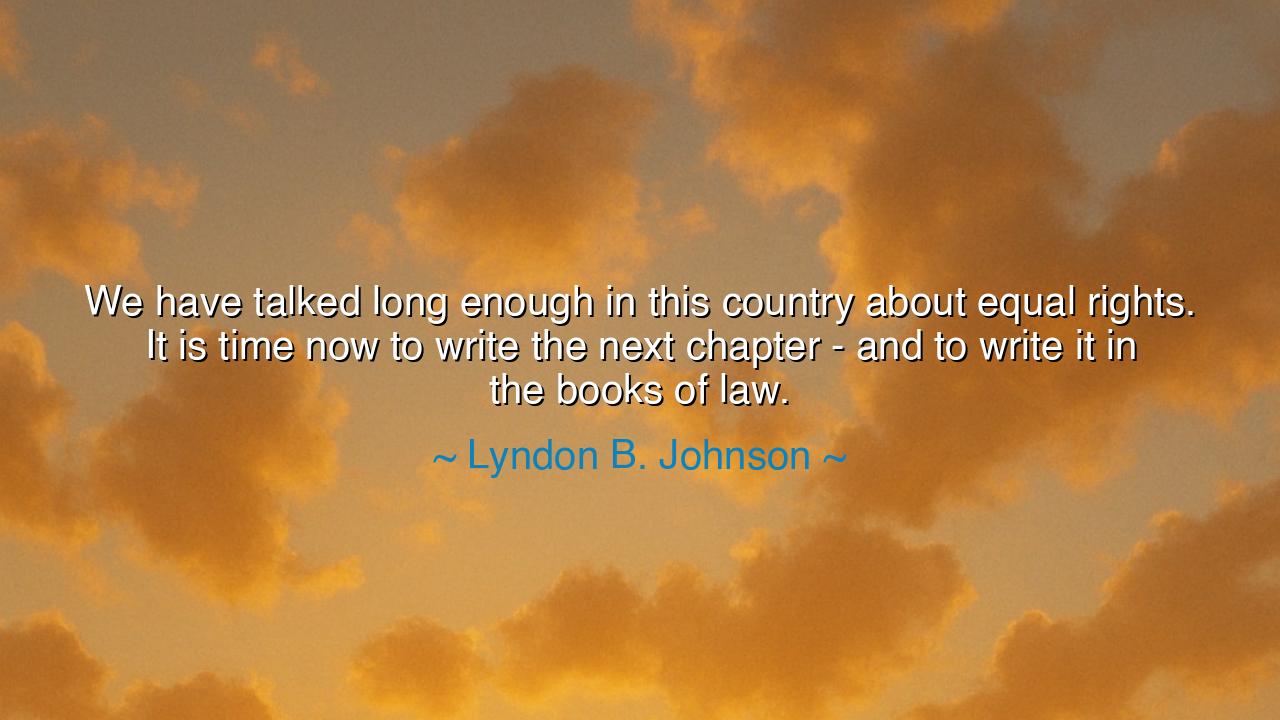
We have talked long enough in this country about equal rights. It
We have talked long enough in this country about equal rights. It is time now to write the next chapter - and to write it in the books of law.






“We have talked long enough in this country about equal rights. It is time now to write the next chapter—and to write it in the books of law.” Thus declared Lyndon B. Johnson, the thirty-sixth President of the United States, a man who rose from humble beginnings to stand at the crossroads of history. His words, spoken in the turbulent year of 1965, burned with both urgency and vision. For generations, America had spoken of liberty, of justice, of equality—but these were dreams trapped in speeches and promises. Johnson’s call was not merely for talk, but for action; not for sentiment, but for structure. He demanded that the ideals of the heart be bound into the law of the land, that justice no longer depend upon the goodwill of men, but upon the enduring strength of legislation.
In those days, the air of America trembled with conflict. The Civil Rights Movement, led by voices like Martin Luther King Jr., had shaken the conscience of the nation. From the steps of Montgomery to the streets of Selma, ordinary men and women had risked their lives to claim what the Declaration had promised them two centuries before—that all men are created equal. Yet equality spoken was not equality lived. Segregation, discrimination, and hatred still stained the soil of freedom. Lyndon Johnson, inheriting both the tragedy of Kennedy’s death and the burden of a divided nation, understood that words alone could no longer mend the wounds of centuries. “We have talked long enough,” he said, for the time of talk had passed. The time for law and justice had come.
It was in this spirit that Johnson signed the Voting Rights Act of 1965, one of the greatest legal victories of the civil rights era. In that moment, the lofty dream of equality took form in ink and parchment. The voices that had cried in the streets were now echoed in the halls of power. Johnson knew that the measure of a nation is not in the speeches it delivers, but in the laws it upholds. Words can inspire; laws can endure. He was, in his way, like a craftsman forging justice into permanence—transforming moral ideals into living systems that could guard the future. His quote thus stands as both a promise and a warning: that ideals without action are mere illusions, and freedom without law is but a shadow of liberty.
The ancients, too, understood this truth. Plato wrote that justice cannot dwell in mere conversation; it must be built into the city, shaped into its customs and codes. A civilization that speaks of virtue but fails to institutionalize it will fall to corruption. Johnson’s call to “write the next chapter” echoes this eternal wisdom. For talk is the beginning of change, but law is its completion. Just as the architect’s vision becomes real only when stone meets foundation, so must a nation’s principles be made manifest through policy, governance, and action. Without that step, the dreamer remains asleep, and the just society never awakes.
Consider the story of Thurgood Marshall, the lawyer who became the first Black Justice of the United States Supreme Court. Before he ascended the bench, he fought in the courtroom for the rights of his people. His victory in Brown v. Board of Education struck down the doctrine of segregation, turning the tide of American law. He, too, understood Johnson’s truth—that equality could not live in speeches alone. Every right secured in the courts was a line written in the book of law, a bulwark against the tides of prejudice. His life’s work gave voice to Johnson’s demand: to move from talk to transformation, from rhetoric to reform.
Lyndon Johnson’s quote, though rooted in the past, speaks still to every generation. It reminds us that justice must be renewed in every age, that every nation must continue writing its own next chapter. Words inspire revolutions, but only laws preserve them. The freedom of one generation can become the forgotten inheritance of the next if it is not safeguarded by law and upheld by conscience. To speak of equality is noble; to build equality into the structure of society is divine. For talk touches the ear, but law shapes the world.
The lesson, then, is clear and enduring: do not let your ideals die as words. Whether in government, in community, or in the quiet reaches of daily life, let action follow belief. Write your values not only in speech but in deed. Support laws that uplift the oppressed. Stand for justice not in whispers, but in votes, in policies, in your daily choices. Each of us holds a pen in the story of humanity, and it is our sacred duty to write with purpose.
So remember the wisdom of Lyndon B. Johnson, children of the future: talk alone cannot free the world. Every right must be written into law; every vision must become action. It is not enough to speak of fairness—you must shape it. It is not enough to dream of equality—you must defend it. For only when justice is carved into the living stone of law does it cease to be a dream and become a destiny. And that, above all, is how nations—and souls—are made free.






AAdministratorAdministrator
Welcome, honored guests. Please leave a comment, we will respond soon